Written by Will Duru, BSc (Hons) Sport and Exercise Science, Level 3 Personal Trainer
Every lifter eventually asks, “How do I keep getting stronger?” The answer lies in the science of progressive overload. This foundational training principle is the secret sauce behind continuous muscle and strength gains. By gradually increasing the challenge to your body, you force your muscles and nervous system to adapt and grow stronger over time.
In this article, we’ll demystify progressive overload and show you how to master it – and importantly, how the 12Reps app (your intelligent strength progression app) makes applying these principles practically effortless. Whether you’re a beginner or experienced, understanding progressive overload and using 12Reps means you’ll never hit a plateau for long. Consider this your guide to consistent, long-term progress, with 12Reps as the essential tool to keep you pushing forward.

What is Progressive Overload? The Foundation of Strength & Muscle Growth
Progressive overload is the fundamental principle that to get stronger or build muscle, you must gradually increase the intensity of your workouts. In simple terms, you must increase the stimulus on your muscles over time for them to continue adapting. If you lift the same weight for the same number of reps every week, your body will eventually become accustomed to it (a plateau), and you’ll stop seeing gains. In fact, without adding any new challenge, you might even regress – muscles can lose size and strength if the stimulus decreases.
Progressive overload ensures that it doesn’t happen by continually nudging your body to do a bit more than before. This “non-negotiable” role in adaptation is backed by science: studies show that steadily increasing training load or volume leads to significant improvements in strength and muscle size. In other words, to continue getting stronger, you must continually challenge yourself. Our bodies are amazingly adaptive; progressive overload is how you stay one step ahead of those adaptations. It’s the bedrock of any effective strength program – and the core philosophy behind how Just12Reps guides your training.
The Many Faces of Progressive Overload (and How Just12Reps Tracks Them)
There’s no single way to apply progressive overload – in fact, there are many “levers” you can pull to make a workout more challenging. Below, we break down the key progressive overload principles and methods – increasing weight, reps, volume, and more – and explain how the Just12Reps app tracks or manages each one to ensure you’re progressing:
Increasing Load (Weight): This is the most common form of progressive overload – simply put, lift heavier over time. For example, if you bench pressed 50 kg for 5 reps last week, try 52.5 kg next time. Even a small jump (about 5% or less) can be enough to stimulate new gains. 12Reps app helps here by logging every weight you lift.
The app knows your personal bests and will suggest when it’s time to nudge the weight upward. Its algorithms are intelligent – they might recommend adding, say, 1–2% of your 1RM (one-rep max) to the bar for your next session, keeping increases small but steady. This aligns with expert guidelines to increase load gradually (often no more than ~5–10% per week) to build strength while minimising injury risk.
Increasing Repetitions: If you’re not ready to add weight, you can do more reps with the same weight, effectively expanding the workload. For instance, progress from 3 sets of 8 reps to 3 sets of 10 reps. Research indicates that adding reps can produce similar muscle growth as adding weight, at least in the early stages of training.
12Reps tracks every rep you perform. The app will notice when you hit the top of your rep range consistently and can signal that you’re ready to move up, either by adding more reps or increasing the weight for the next workout. In essence, if you keep breezing through, say, 10 reps when the program called for 8, Just12Reps will know you’re due for a new challenge!
Increasing Sets (Total Volume): Another way to apply progressive overload is to do more sets of an exercise, thereby improving your total training volume. For example, going from 3 sets per exercise to 4 sets increases the overall work your muscles perform. Higher volume (within recovery capacity) is a proven driver of muscle hypertrophy.
The 12Reps app tracks the number of sets you complete for each exercise and can incorporate additional sets into your plan when necessary. It might start you with, say, 2–3 sets as you learn an exercise, then automatically bump you to 4 sets over time as your endurance and work capacity improve. By tracking your workout history and performance, the app ensures that extra volume is added only when you’re ready for it (and not at the expense of form).
Decreasing Rest Time: Shorter rest periods between sets make your muscles work harder, increasing fatigue – this is a form of progressive overload that targets your workout’s density and intensity. For example, if you usually rest 2 minutes between sets of squats, cutting that down to 90 seconds forces your muscles to perform under greater fatigue.
This method can boost muscular endurance and even strength (since the effort per unit time increases) . Just12Reps includes a built-in rest timer, so you can monitor and gradually reduce your rest intervals as needed. The app’s programs might prescribe shorter rests in certain phases, and by following the timer, you ensure you’re pushing your body in this dimension. (Of course, for very heavy lifts aimed at pure strength, the app will still give you ample rest – it intelligently adjusts rest periods based on the workout goal.)

Improving Form/Range of Motion: Making an exercise more effective through better technique can overload your muscles without changing the weight or reps. For instance, squatting a bit deeper (increasing your range of motion) or pausing at the bottom of a rep forces your muscles to work harder.
Completing each rep with strict form (no cheating or momentum) also increases the muscle tension. Essentially, you’re getting more out of the same movement. Just12Reps helps you improve here by providing exercise demos and form tips right in the app (so you perform each lift correctly).
By following the app’s guidance on proper form, you might find a given weight feels tougher – meaning your muscles are being challenged more, which is precisely what we want. Always master technique before piling on more weight – the app’s focus on good form ensures you’re progressing safely and effectively.
Increasing Training Frequency: Another lever is working out more often. This doesn’t mean never taking rest (recovery is crucial), but gradually increasing the frequency of training a muscle group each week can spur further gains. For example, if you currently train legs once a week, moving to twice a week (while managing volume) increases the overall stimulus. Just12Reps acts as your training planner, helping schedule your workouts optimally.
It might start you on a 3-day-per-week routine and, down the line, increase to 4 days, or take you from hitting each muscle 1 time per week to 2 times per week once you have the capacity. The app ensures you still get enough recovery – it won’t have you work the same muscle on back-to-back days – but by tracking your routine, it can intelligently add sessions. This way, progressive overload can occur in the form of an extra workout that fits your program.
Increasing Time Under Tension (Tempo): Slowing down your reps or adding pauses increases the time your muscles are under tension, making the exercise more challenging. For instance, performing a bench press with a 3-second slow descent (eccentric phase) or pausing for 2 seconds at the bottom of a squat creates more muscle tension than a quick rep.
This technique builds strength and endurance by overloading muscles in a different way – they must sustain effort for a more extended period. The 12Reps app may incorporate tempo prescriptions in its workouts (e.g., telling you to lower slowly or hold at a certain point). By following these tempo guidelines in the app’s plan, you effectively overload your muscles without needing to use heavier weights. Even if the app doesn’t explicitly count seconds for you, you can use the notes section or tempo cues in the workout description. Over time, manipulating rep speed is yet another progression method to maintain your gains.
As you can see, progressive overload has many faces – it’s not just about adding weight. An effective training program will employ several of these methods over time. The beauty of 12Reps is that it tracks all these variables for you. Every workout you log – weights, reps, sets, rest – feeds into the app’s brain. It knows when you’ve hit a milestone or when an exercise is consistently getting easier. By monitoring all facets of your training, 12Reps can manage the complexity of progressive overload and present it to you in a simple, actionable way (like a new target to aim for in today’s workout).

How Just12Reps Automates Your Progressive Overload
Imagine having a personal strength coach who meticulously notes down every lift you do, analyses your progress, and tells you exactly how to improve next time. That’s essentially what 12Reps does – it automates the role of a coach to apply progressive overload intelligently on your behalf. Here’s how the app’s innovative features help drive continuous progression:
Intelligent Algorithms & Personalisation: 12Reps uses algorithms (and even AI) to guide your workouts. After each workout, when you’ve logged your sets, reps, weight, and saved the workout, it knows what you accomplished and uses that history to plan your next step based on what body part you’ve chosen to train. Did you hit all your reps easily? The app helps you keep track and also vary the exercises you’re doing (whether it’s weight or reps). By continuously adjusting your plan, the app ensures you’re always following the principles of progressive overload without needing to calculate it manually.
Historical Data & 1RM Tracking: The app maintains a detailed log of your workouts, effectively serving as a diary of your strength journey. This workout history isn’t just numbers; it’s used to gauge trends and suggest areas for progress. One powerful feature is the 1RM tracker – Just12Reps can estimate your one-rep max for key lifts based on your logged sets (using established formulas).
Tracking your 1RM over time allows the app to personalise weight suggestions (for example, programming your sets as percentages of your maximum) and measure your actual strength progression. You’ll always know your current strength benchmarks.
Built-in Progressive Plan: When you use Just12Reps, you’re essentially following a built-in progressive overload program by default. The app’s expert-designed plans incorporate periodisation and staged increases. For example, a program might start you at a moderate intensity, then increase either the reps or the weights each week, culminating in a new personal best test.
It also balances the different methods of overload we discussed – perhaps in one phase, you can focus on adding reps and volume to your training, while the next phase emphasises adding weight. Throughout, Just12Reps ensures progression is gradual and safe because you have the video demo to see the proper technique.

Too Much, Too Soon: Perhaps the biggest mistake is increasing the weight or intensity too quickly. Progressive overload is a gradual process – if you jump from lifting 50 kg to 60 kg in one go, your body likely isn’t ready for that leap.
Pushing too hard, too fast, can lead to injury or overtraining. Remember, muscles and connective tissues need time to adapt. It’s far more effective to make small, consistent increments (e.g. 2–5% weight increases, one extra rep at a time) than to make giant leaps and then get hurt. Just12Reps is designed to prevent this by recommending conservative increases and by flagging if you’re struggling. Avoid the “ego” urge to load the bar with a weight you can’t handle – progress, don’t ego-lift.
Neglecting Form: Progressive overload should never come at the expense of proper form. If adding weight causes your technique to break down (e.g. half-repping your squats or contorting your back on a deadlift), you’re doing more harm than good. Lifting with poor form not only reduces the effectiveness of the exercise but also dramatically increases the risk of injury.
Experts emphasise that you should master an exercise with excellent form before increasing the load or difficulty. So, resist the temptation to chase numbers while your form suffers. Instead, use improvements in technique as a form of progression itself (as we noted earlier). The 12Reps app can help by providing exercise tutorials and reminding you only to increase weight when you can perform all prescribed reps with good form. Focus on quality over quantity, always.
Not Tracking Your Workouts: If you don’t track your workouts, you can’t effectively apply progressive overload. A surprising number of gym-goers “wing it” and end up lifting the same weights or doing the same reps for months, simply because they lost track of last week’s numbers. The key to continuous progression is knowing precisely what you lifted and how many reps you did, so you have a target to beat next time. Logging your workouts is crucial.
Forgetting to track is a mistake that stalls progress. This is where 12Reps app truly shines – it automatically records your sets, reps, and weights, giving you a clear history. No more guessing if that dumbbell you grabbed is heavier than last time – you’ll know it is. By keeping a log (whether via an app or a notebook), you create accountability and a roadmap for overload. Avoid going in blind; use a tracker like Just12Reps to stay on course.
Avoiding these mistakes will ensure that progressive overload works in your favour, not against you. In essence: increase gradually, never sacrifice technique, and track everything. If you do those three, you’ll reap the full benefits of progressive overload safely. And, of course, the Just12Reps app is designed to encourage these good habits – it nudges you toward appropriate increments, reinforces proper form through guidance, and keeps meticulous track of your progress.

Conclusion: Unlock Continuous Progress with Smart Overload
Understanding and applying progressive overload is the key to unlocking continuous strength gains. It’s a time-tested principle backed by science and championed by coaches – and now, it’s available at your fingertips through the 12Reps app.
By gradually challenging your body in various ways (weight, reps, volume, and more), you trigger the adaptations that make you stronger and fitter. The process requires patience and consistency, but the results are inevitable: your muscles will respond by growing larger, and your lifts will steadily increase.
The beauty of using Just12Reps is that it makes this whole process practical and foolproof. You don’t have to micromanage numbers or wonder what to do next – the app’s smart progressive overload system does it for you, ensuring you always have the right challenge to keep improving. No more plateaus born of monotony, and no more risk of doing too much too fast. With 12Reps, you have an intelligent partner that adjusts to your performance and keeps you on track towards your goals.

In summary, progressive overload is the engine of progress, and 12Reps is the vehicle that lets you drive that engine efficiently. Every workout you complete with a little more than before is a victory – a step up the ladder of strength.
Over weeks and months, those steps add up to transformative changes in your physique and performance. So, embrace the principle of progressive overload in your training and let Just12Reps simplify the journey. Stay consistent, trust the process, and watch as you break past your old limits. Download the 12Reps app and make progressive overload your competitive edge – your future, stronger self will thank you for it!
References
Schoenfeld, B. J. (2010).
The mechanisms of muscle hypertrophy and their application to resistance training.
Journal of Strength and Conditioning Research.
Explains how hypertrophy works and why it requires specific training—most general strength plans won’t bulk you up significantly without nutrition to match.
Willis, L. H., et al. (2012).
Comparisons of aerobic training, resistance training, and combined training on weight and fat loss in overweight adults.
Journal of Applied Physiology.
Found that resistance training helps maintain muscle mass and reduce fat even better when combined with moderate cardio.
Westcott, W. L. (2012).
Resistance training is medicine: effects of strength training on health.
Current Sports Medicine Reports.
Reviews how strength training helps regulate hormones and metabolism, making fat loss easier and more sustainable.
Hunter, G. R., et al. (2000).
Resistance training increases total energy expenditure and free-living physical activity in older adults.
Journal of Applied Physiology.
Resistance training boosts resting metabolic rate, meaning you burn more calories at rest—even without “bulking up.”







